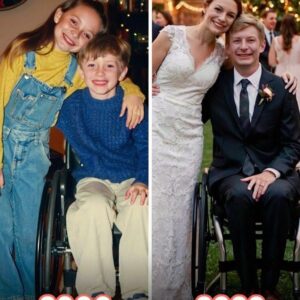When my mother-in-law volunteered to film our daughters’ prom night, I thought it was finally a sign of change—a gesture that maybe, just maybe, she was starting to see Emma as part of the family too. But the moment we pressed play on that video, what unfolded was far from heartwarming. It was a shocking display of bias, and it left our entire family stunned into silence.
Emma and Lily weren’t sisters by blood, but we raised them side by side, always striving for fairness. Same rules, same birthday budgets, same love. They were both our girls. But Carol, my husband’s mother, never really saw it that way. Her warmth for Lily, her biological granddaughter, was effortless and overflowing. Her treatment of Emma? Cordial at best, indifferent at worst.
We kept hoping time would change that. We were wrong.
As prom approached, I planned to hire a videographer to capture the night both girls had been looking forward to for months. But Carol offered enthusiastically to handle it herself. “Let me do it,” she said. “I want to film this for my granddaughters.” That word—granddaughters—made me pause. It was the first time I’d ever heard her say it in the plural. I was moved. Maybe things really had changed.
On prom night, Carol showed up with two cupcakes—one with Emma’s name in pink icing, the other with Lily’s in purple. That small gesture felt like a breakthrough. The girls looked stunning, buzzing with excitement, and I couldn’t wait to see their night captured through Carol’s lens.
A week later, we gathered in the living room for the big screening. Bowls of popcorn, excited chatter—it felt like a movie premiere. Carol pressed play. The screen came to life with Lily twirling in her shimmering gown, smiling into the camera. Carol’s voice behind the footage was tender, emotional. “Look at her,” she whispered. “So beautiful.”
The camera followed Lily closely, zooming in with care, catching every smile, every moment. Then, the footage shifted to Emma… or so we thought. As Emma entered the frame, the camera abruptly tilted down, revealing nothing but Carol’s floral dress and the corner of her handbag.
Then came her voice—detached and icy. “Here comes the other one. What a shame about that hair… looks like she didn’t even try.”
The room went silent. My heart dropped.
The footage continued. While Lily’s moments were crisp and cinematic, Emma’s appearances were sporadic and blurry, if they appeared at all. At one point, I could be heard off-camera asking, “Carol, are you getting Emma too?”
“Oh,” she replied flippantly, “I thought I was recording.”
Emma stood and left the room quietly. “I’m fine,” she said over her shoulder, her voice cracking.
Lily sat frozen. My husband’s jaw tightened. I stood up, removed the memory card, and handed it to Carol.
“You don’t deserve to hold these memories.”
Carol tried to defend herself. “It was a mistake! I must’ve pressed the wrong button—”
But I wasn’t having it. “This wasn’t about a button. You narrated your thoughts loud and clear. You called my daughter the other one. You erased her from a night she’ll remember forever.”
Then Lily spoke—soft, but firm. “I’m ashamed of you, Grandma. Emma is my sister. You don’t get to treat her like she’s nothing and still call yourself family.”
Carol looked to my husband. He said just six words: “Mom, I think you should leave.”
She did. Alone.
But the story didn’t end there. What we didn’t know was that Carol had recorded more than she intended. Her voice, captured clearly on the tape, didn’t just slip—she revealed her true feelings. Over the following days, she watched that video again and again. And for the first time, she really heard herself.
She reached out to my husband, texting excuses, then apologies. Silence.
Then on Father’s Day, she came to the door with a gift—a bracelet she called a “do-over.” We left it on the porch. By morning, it was gone.
But Carol didn’t give up. A few days later, she returned. No gifts. No performance. Just a woman, humbled by shame, hoping for a second chance. We let her in.
“I was jealous,” she confessed. “Jealous that Emma had the kind of heart I wish Lily had. I saw them getting close and felt like I was losing my place. But that’s no excuse. I punished an innocent girl. And I see that now.”
We didn’t forgive her instantly. We asked for time.
But a week later, she sent Emma a handwritten letter. No grand words. No defenses. Just: “I hope one day you’ll allow me the chance to know you.”
Silence stretched on—until one afternoon, Carol got a call. Lily.
“Emma’s willing to talk,” she said. “There are conditions: no private chats, no cameras, no hugs.”
Carol agreed without hesitation.
That weekend, we sat together—Carol, Emma, Lily, and me. It was tense at first. But then Emma began to open up—about her plans, her dreams of becoming a teacher, her love for literature. Carol listened. She didn’t interrupt. She didn’t fake warmth. She just listened.
“I didn’t know you wanted to be a teacher,” Carol said.
“There’s a lot you don’t know about me,” Emma replied.
“I’d like to learn,” Carol said. “If you’ll let me.”
Emma didn’t say yes. But she didn’t say no.
And sometimes, that’s enough.
Trust isn’t restored overnight. But every honest word, every apology without expectation—that’s a start. Carol no longer hides behind a camera or a false smile. She shows up now, raw and real, ready to do the work.
For the first time, we see a woman trying—not to rewrite the past—but to be worthy of the future.





